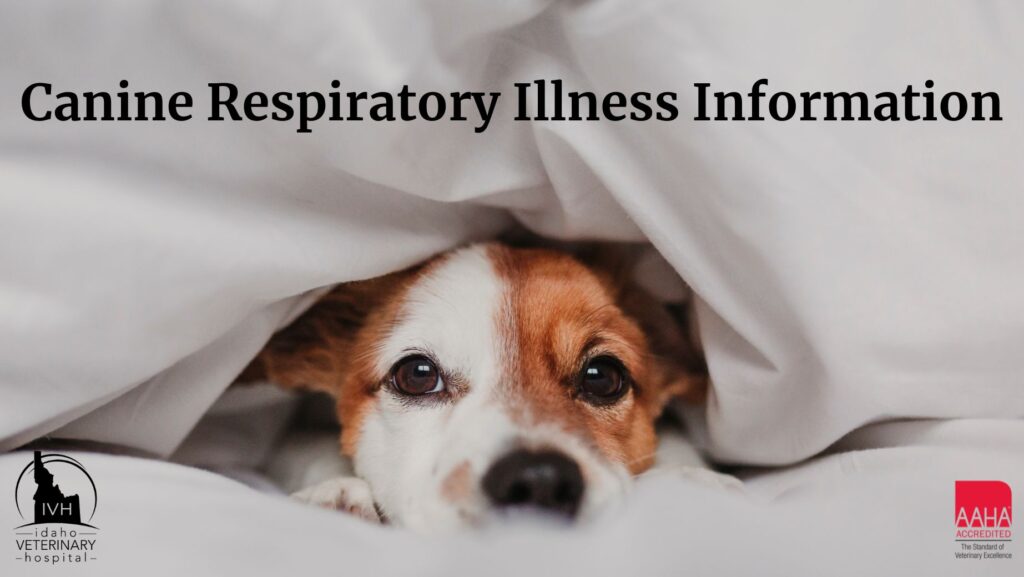
In August 2023, reports started of an atypical canine infectious respiratory illness. The cases are presenting with prolonged coughing which can last weeks to months with minimal response to treatment. In some cases, the dogs have progressed to contracting pneumonia and require hospitalization. In rare cases, the canine patients progress quickly from pneumonia to death.
Some diagnostics have been completed, but there has not been any conclusive testing to indicate what may be causing the increased prevalence of this respiratory disease. This does not necessarily mean this is a new or novel virus as there are many causes for canine respiratory infections, but we are working on additional diagnostics at this time.
What is Currently Known
Based on the epidemiology of the cases reported to date, the cases appear to share a viral etiology, but common respiratory diagnostic testing has been largely negative, and the cause remains unknown. A handful of cases have tested positive for M. cynos, but that is not believed to be the underlying causative agent.
The cases reported appear to primarily fall within three general clinical syndromes:
- Chronic mild-moderate tracheobronchitis with a prolonged duration (6-8 weeks or longer) that is minimally or not responsive to antibiotics.
- Chronic pneumonia that is minimally or not responsive to antibiotics.
- Acute pneumonia that rapidly becomes severe and often leads to poor outcomes in as little as 24-36 hours.
Should Dog Owners Be Worried?
We suggest caution rather than worry. The number of cases reported represents a small percentage of the dog population.
Periodic outbreaks of Canine Infectious Respiratory Disease Complex (CIRDC) can occur in a dog population. At least nine different known bacteria and viruses have been linked as causes of CIRDC, which is transmitted by respiratory droplets. Infection with more than one bacterial or viral agent is common. Symptoms include coughing, sneezing, nasal and/or eye discharge, and lethargy. If your dog shows these symptoms, please contact your veterinarian. We encourage you to speak to your veterinarian about what vaccines are appropriate for your dog. These may include canine influenza, Bordetella and parainfluenza.
If you have concerns about your dog being present in groups of dogs, such as at an agility event or while boarding, we recommend that you consult with your veterinarian about recommendations for infection prevention and mitigation.
General suggestions for dogs attending events or situations with a group of other dogs include:
- Make sure all dogs are up-to-date on all their vaccines including canine influenza, Bordetella and parainfluenza.
- For event organizers: Dogs should have a health check 12-24 hours before the event. Have a DVM onsite checking dogs for health issues (mild nasal discharge, cough, elevated temperature, being off food).
- Please consult with your veterinarian for dog-specific advice before attending any events where dogs are congregated.
CIRDC Backgrounder
Periodic outbreaks of Canine Infectious Respiratory Disease Complex (CIRDC) can occur in a dog population and some cases can be serious. Transmitted by respiratory droplets, both viruses and bacteria can cause CIRDC.
CIRDC cases more commonly occur in animals housed in settings such as shelters, boarding, or training facilities rather than in animals housed in private homes, especially those with limited access to other dogs.
Veterinarians treat cases according to the dog’s symptoms and severity of symptoms. Treatment may include antibiotics. Most dogs, especially those vaccinated against respiratory illness, experience a mild illness.
Symptoms of CIRDC include coughing, sneezing, nasal and/or eye discharge, and lethargy. If your dog shows these symptoms, please check with your veterinarian.
Dog owners can help protect their pets from respiratory illnesses in general by:
- Reducing contact with large numbers of unknown dogs. Just like with other respiratory pathogens, the more contacts your dog has, the greater the risk of encountering a dog that’s infectious.
- Reducing contact with sick dogs. This can be harder to determine but if a dog looks sick (coughing, runny nose, runny eyes), keep your dog away from it.
- Keep sick dogs at home and seek veterinary care.
- Avoid communal water bowls shared by multiple dogs.
- Ask your veterinarian for advice on which vaccinations your dog should have. Common vaccinations include canine influenza, Bordetella and parainfluenza.
- If it’s sick, consider having your dog tested with a PCR test to help determine the causative agent (viral/bacterial), if possible.



Comments are closed.